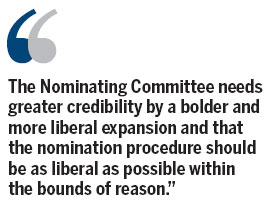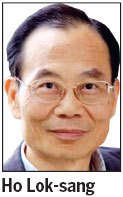Universal suffrage only possible within the bounds of the law
Updated: 2014-01-09 07:05
By Ho Lok-Sang(HK Edition)
|
|||||||||
In my last article, I expressed concern about Scholarism and its supporters' calls for "civil nomination" based on popular opinion. My concern is not so much that "civil nomination" per se causes problems for Hong Kong or for Beijing, but that "civil nomination" blatantly contravenes the Basic Law. I am shocked to see that some lawyers and lawmakers could bend the rule of law at will, in saying that "a broadly representative nominating committee", as specified in Article 45 in the Basic Law, could mean the entire body of the electorate. I have argued that the words "broadly representative" and "committee" imply the committee must be a subset of the electorate. If Scholarism believes otherwise, then it should take the matter to court and request an interpretation from an honorable judge. Acting within the framework of the law is the least we expect of any member of a civilized society.
In this article, I want to take another perspective: To argue that the Nominating Committee needs greater credibility by a bolder and more liberal expansion and that the nomination procedure should be as liberal as possible within the bounds of reason. Without increasing the credibility of this crucial procedure, the whole exercise will not help restore public trust in the government. And it will not enhance the sense of legitimacy of the Chief Executive (CE) so crucial to his or her effectiveness.

Elsie Leung Oi-sie, vice-chairwoman of the HKSAR Basic Law Committee of the National People's Congress Standing Committee, recently said that an endorsement by at least 50 percent of the Nominating Committee members should be required for a person to qualify as a candidate in the 2017 CE Election. This appears to be an interpretation of how the "collective will" of the Nominating Committee may be manifested. This proposed new requirement is not specified in the Basic Law, and may have been prompted or provoked by threats from the Occupy Central movement and other actions on the part of some Hong Kong people. They have eroded the trust which is so crucial to successful implementation of universal suffrage in the election of the CE in 2017.
I now see a polarization of views which has cast a dark shadow on the prospect of implementing universal suffrage in 2017. On the one hand, we have an anti-Beijing camp which directly challenges the Basic Law and which accuses the central government of staging a fake universal suffrage. On the other hand, we have the pro-Beijing camp panicking and trying to tighten up the rules - in an apparent attempt to avoid any possibility of a subversive person being elected. As an observer, I can tell that these are signs of a vicious cycle which could certainly bring about the demise of universal suffrage. The Legislative Council will simply fail to come up with a two-thirds majority in support of any proposal to take universal suffrage forward.

I thought my wish was pretty straightforward and logical. Hong Kong people regard the rule of law as an integral part of their "core values". We must not trample on this. So I urge Hong Kong people not to support the Occupy Central movement. Those who use the Occupy Central campaign in a threatening way to demand "genuine universal suffrage" argue that it is just "civil disobedience" intended to "seek justice". But hurting other people arbitrarily is unjust. They also argue that the price is worth paying - if they can achieve "genuine universal suffrage". But can they? I only see them as undermining mutual trust.
If asking the anti-Beijing camp to stay within the bounds of the law and reason is not possible, I hope that Beijing, and all those who want Hong Kong to have a bright future, will nevertheless refrain from tightening up the election rules. Chapter 49 of the great text, Tao Te Ching (The Classic of the Way and the Virtue), says:
If people are good, I shall be good to them.
If people are not good, I shall also be good to them.
This way I am really good.
If people are truthful, I shall be truthful to them.
If people are not truthful, I shall also be truthful to them.
This way I am really truthful.
I hope that regardless of what the opposition camp does, Beijing and its supporters will not lose their good sense. Someone must take the lead, with a strong will and with wisdom, to break the vicious cycle. Hong Kong needs the most liberal form of universal suffrage within the bounds of the law.
The author is director of the centre for Public Policy Studies at Lingnan University.
(HK Edition 01/09/2014 page1)